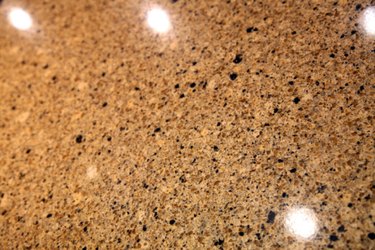
Granite countertops are a beautiful, practical way to add value to your home. This durable material resists scratching and chipping. Over the years, however, it can be damaged by continuous rough treatment. If your granite countertop has become dull or scratched, you can choose to have it repaired or refinished. Severe damage may require you to replace the entire countertop, though.
Scratched Sealer
Video of the Day
Most granite countertops have been coated with a granite sealer before or after installation. This sealer is a polymer-based liquid that sinks into the surface of the granite, creating a smooth coating that's hard to stain. However, sealers can become scratched over time. Cutting food directly on the granite countertop or spilling acidic substances can scratch or etch the sealer. Large scratches appear as grooves in the surface of the counter, while small ones may look like dull spots.
Video of the Day
Unsealed Counters
Granite itself doesn't scratch easily, but it is made up of many tiny cracks and pores. This means that your unsealed granite countertop may be at risk for stains and other minor damage. Acidic spills, oily foods and strongly colored foods like wine or grape juice can leave their mark on your counter. You can also scratch or dull granite by placing a hot pan directly on the surface. Engagement rings can also hurt unsealed counters. According to "Chicago Home + Garden" magazine, a diamond is one of the only substances hard enough to scratch granite surfaces.
Cracks
Changes in temperature or a sudden shock can crack your durable granite countertop. Take care not to drop heavy objects, such as a cast iron pan or heavy appliances, onto your counter's surface. The blow can knock a chip out of the granite or cause cracking. Hot pans placed directly on both sealed and unsealed counters may also encourage cracking, since the sudden heat encourages uneven thermal expansion. Fix cracks with colored resin that matches the granite, but remember that no repair is completely invisible.
Solution
Remove small scratches from your granite countertop by buffing with a fine abrasive. Clean the counter thoroughly, then grind the surface gently using a hand-held orbital buffer. This will remove the upper layer of the counter, and along with it, the scratches. Use progressively finer abrasives to produce a polished surface that looks like new, then seal the countertop using a polymer sealing compound to reduce the risk of staining.